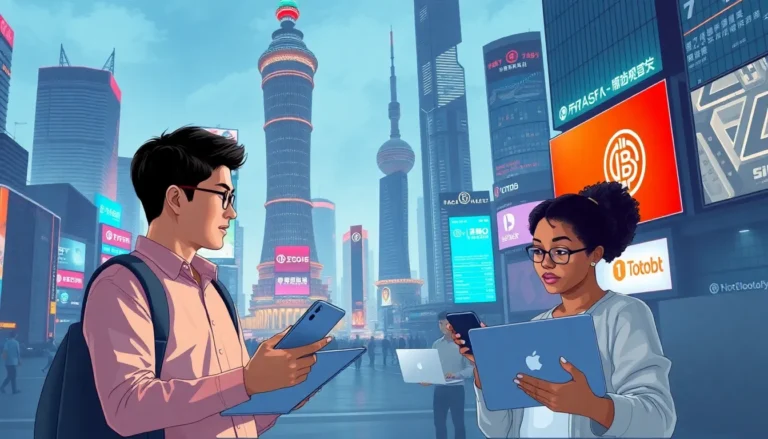Table of Contents
ToggleIn today’s fast-paced world, the term “culture hustle” has become a buzzword that’s hard to ignore. It’s not just about grinding away at a desk; it’s about weaving creativity into everyday life. Whether it’s launching a podcast after hours or turning a weekend hobby into a side gig, the culture hustle is all about blending passion with productivity.
Imagine a world where your love for art, music, or even knitting can pay the bills. Sounds dreamy, right? But here’s the catch: it takes more than just a good idea to make it happen. It requires savvy, strategy, and a sprinkle of that entrepreneurial spirit. Buckle up as we dive into the world of culture hustle, where ambition meets creativity and every day is an opportunity to turn dreams into reality.
Understanding Culture Hustle
Culture hustle represents the intersection of creativity and entrepreneurship. This concept highlights how individuals blend passion with financial ambition in modern society.
Definition of Culture Hustle
Culture hustle refers to the practice of generating income through creative endeavors. Entrepreneurs leverage their talents in art, music, writing, or other fields to create side projects. Such projects often grow into viable revenue streams. The drive behind this hustle is the desire to monetize personal interests and skills. Individuals pursuing culture hustle prioritize innovation and adaptability to succeed.
Historical Context
The roots of culture hustle trace back to the gig economy’s rise in the 21st century. Many people began turning hobbies into businesses as traditional job markets evolved. In this context, creators found new opportunities through digital platforms. Online tools facilitated connections between creators and audiences, enhancing visibility. Over time, the culture hustle gained traction, empowering diverse individuals to explore their passions while seeking financial independence.
The Impact of Culture Hustle

Culture hustle influences various aspects of modern life, fostering creativity, innovation, and social trends.
On Creativity and Innovation
Creativity finds new paths through culture hustle. Individuals no longer limit themselves to traditional roles but explore innovative projects. Entrepreneurs harness their artistic talents to create unique solutions, generating income while expressing themselves. New technologies empower creators, allowing them to reach larger audiences. Platforms like social media showcase diverse voices and talents, enhancing collaboration across fields. Those who engage in culture hustle contribute to a rich tapestry of ideas, sparking further innovation and inspiring others to pursue their passions. Statistical data indicates that roughly 36% of U.S. workers participate in the gig economy, highlighting the shift toward entrepreneurship and creativity-driven professions.
On Social Trends
Social trends reflect the rise of culture hustle in society. The gig economy reshapes perceptions of work, emphasizing flexibility and independence. More people prioritize passion-driven careers over conventional jobs. Young adults, in particular, gravitate toward entrepreneurship, seeking opportunities that align with their interests and values. Community engagement flourishes as creators share their journeys and collaborate on projects. Cultural movements now emphasize diversity and inclusion, encouraging representation in the arts. These shifts drive awareness and appreciation for unique experiences and perspectives. Reported data shows that 61% of millennials prefer employers supporting creativity and innovation, demonstrating the growing importance of culture hustle in the workforce.
Techniques for Successful Culture Hustling
Successful culture hustling requires effective strategies. Utilizing creativity and entrepreneurship fosters pathways to income generation.
Building a Personal Brand
Developing a personal brand enhances visibility in the crowded creative market. Crafting a unique identity sets an individual apart from others, allowing for distinct expression. Authentic storytelling strengthens connections with audiences. Consistency in branding fosters recognition across platforms. Engaging online presence through social media channels showcases a creator’s work effectively. According to data, approximately 36% of U.S. workers participate in the gig economy, emphasizing the need for strong personal branding to compete successfully. Creating content that reflects personal values draws like-minded individuals and potential collaborators. Prioritizing authenticity in interactions builds trust, leading to lasting relationships.
Networking in Creative Industries
Networking plays a vital role in culture hustle success. Attending industry events opens opportunities for collaboration and learning, expanding connections. Engaging with fellow creatives builds community, essential for mutual support in pursuing projects. Utilizing online platforms can connect individuals with industry professionals, increasing exposure. Insightful exchanges at networking events often lead to new opportunities and partnerships. Participating in forums and discussion groups also deepens relationships within creative industries. Data indicates that 61% of millennials prefer employers supporting creativity, highlighting the importance of networking for aspiring creators. Prioritizing relationships over mere transactions enriches the experience, resulting in potential collaborations that elevate projects.
Challenges in Culture Hustle
Navigating the culture hustle presents unique challenges that require persistence and strategic approaches.
Overcoming Burnout
Burnout is a common issue among culture hustlers. Balancing creative pursuits with financial demands can cause exhaustion. Taking regular breaks helps maintain mental health and creativity. Setting realistic goals lowers stress and fosters a sustainable pace. Seeking support from peers offers motivation and accountability. Prioritizing self-care allows hustlers to recharge and focus on their passion effectively. Recognizing early signs of burnout empowers individuals to implement preventive measures and maintain productivity over the long term.
Navigating Criticism
Criticism is an inevitable part of the culture hustle journey. Feedback can be constructive or demotivating, depending on its delivery. Embracing constructive criticism enables personal and professional growth. Identifying valuable insights helps enhance creative work and refine strategies. Developing resilience against negativity requires a strong sense of self-awareness and reaffirmation of personal vision. Engaging with supportive communities fosters a positive environment, mitigating the impact of harsh feedback. Activating a growth mindset transforms challenges into learning experiences, helping individuals take their creative endeavors to new heights.
Embracing culture hustle opens doors to endless possibilities for those willing to blend creativity with entrepreneurship. As individuals navigate this dynamic landscape they not only pursue their passions but also contribute to a vibrant community of creators. The journey requires resilience and strategic thinking but the rewards can be significant.
By fostering connections and prioritizing personal branding culture hustlers can carve out their unique space in the market. This approach not only enhances visibility but also cultivates meaningful relationships that drive success. As the gig economy continues to evolve the culture hustle will undoubtedly play a crucial role in shaping the future of work and creativity.







